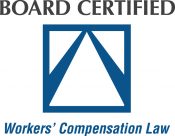Workers’ Compensation in Raleigh, and throughout NC
The North Carolina Workers’ Compensation Act was adopted in 1929 as a statutory compromise between employees and their employers. Under the Act, employees are entitled to compensation for injuries suffered on the job even if their employer was not at fault and even if the injury was due to the fault of the injured employee. However, in exchange for the right to receive compensation when the employer was not at fault, employees gave up their right to sue their employer for damages, even when the employee’s injury was due to the employer’s negligence. Injured workers in Raleigh and throughout North Carolina are entitled to compensation in three categories:Temporary Total Disability Compensation.
Under North Carolina workers’ compensation law, if an injured employee is unable to work as a result of the injury, they are entitled to payment of two-thirds of the average amount earned prior to the date of injury. Employees who are unable to work are entitled to temporary total disability compensation until able to return to work.Payment For Medical Treatment.
In North Carolina, an injured worker is entitled to have the employer pay for all medical treatment related to the injury, for so long as the treatment provides some benefit to the employee. Even though the law requires the employer to pay for medical treatment, insurance companies commonly refuse to pay for treatment without a reasonable basis for doing so. The right to payment for medical expenses is very valuable. If the employer refuses to pay for medical treatment there are legal procedures available so that employees’ right to medical treatment may be protected.Compensation For Permanent Impairment.
Depending on the facts of the case, North Carolina workers’ compensation law may require the employer to compensate the injured worker for any permanent impairment resulting from the injury. The amount of compensation to be paid depends on the part of the body that was injured and the severity of the injury. Certain bodily injuries commonly result in some degree of permanent impairment, such as- Back and neck injuries
- Elbow injuries
- Shoulder injuries, including rotator cuff and labral tears
- Knee injuries, involving torn cartilage, ruptured tendons, fractured or dislocated patella
- Hand injuries
- Foot and ankle injuries
- Brain injuries/traumatic brain injuries
- Loss of hearing
- Amputations
- Hernias
Representing Injured Workers
The Law Office of John A. Hedrick, PLLC represents injured workers in Raleigh and throughout North Carolina. Mr. Hedrick practices workers’ compensation law exclusively and confines his practice to representing injured workers. Mr. Hedrick limits the size of his practice so that he can provide each of his clients with the attention they deserve. North Carolina workers’ compensation law is complicated. However, you have many valuable rights. If you have questions about your right to temporary total disability compensation, payment for medical treatment or compensation for permanent impairment, please contact the Law Office of John A. Hedrick, PLLC in Raleigh. You may contact us by telephone at 919-977-0804, email us, or complete our Free Claim Evaluation form.FAQ answered by John Hedrick
Our clients often question about the process of a workers’ compensation case and terms that we use in the industry. Click to expand the information boxes below to see how John Hedrick responded to each question. If you have any other questions concerning workers’ compensation issues, contact the Law Office of John Hedrick for answers.
No, you do not have to work with a lawyer to file a claim. However, if you have a serious injury, you will be better off having an attorney to represent you and guide you through the process.
The Industrial Commission is the state agency which serves as the court for workers’ compensation claims. The Industrial Commission does not assist injured workers’ with legal issues. If the insurance company denies the claim, the injured employee should hire a lawyer to requests a hearing with the Industrial Commission.
Permanent partial disability is a legal term used in the workers’ compensation field to refer to any permanent loss of use or permanent impairment of a body part due to an injury.
Temporary total disability is, again, a workers’ compensation term that refers to weekly payments of compensation made to an injured employee while she or he is unable to work.
The general rule is that for an injury to be covered by workers’ compensation, the injury has to result from an accident – a slip, trip, or fall. However, there is another class of workers’ compensation claims known as occupational diseases that may be covered by workers’ compensation in the absence of an accident.
Yes. That was one of the primary purposes of the NC Workers’ Compensation act – to take negligence out of the equation.
Your work injury should be reported immediately, in writing, to your employer. I highly recommend that you keep a copy of the written accident report.
Yes, if a doctor excuses you from work or restricts you to light duty and your employer does not have light duty available to you.
Workers’ compensation attorneys work on a contingency fee basis, which means that the attorney does not get paid unless he or she recovers compensation for the employee.
Medical travel expenses are reimbursable if the roundtrip mileage is 20 miles or greater. The
reimbursement rate varies each year based on the federal rate for mileage reimbursement.
Yes. The law allows for a second opinion. However, you want advice from a workers’ compensation attorney when selecting a physician for a second opinion.
Generally speaking, if your claim is being covered by workers’ compensation, the insurance company will select your doctor.
A Form 18 is a form published by the Industrial Commission that the injured employee completes and files with the Industrial Commission and, by doing so, he or she has filed his or her claim for workers’ compensation benefits.
A Form 19 is simply a report of injury that the employer is required to file with the Industrial
Commission. A Form 19 is not the same as a Form 18 because it does not constitute a claim filed by the employee. It is a report of injury, not a claim filing.
A Form 33 is an employee or employer’s request for a hearing by the Industrial Commission to resolve some matter that might be in dispute, whether the claim has been denied or some other ancillary issue. I do not recommend that injured employees ask for a hearing without hiring a lawyer.
The law states that a claim must be reported to the employer in writing within 30 days of the injury, unless the employer has an actual notice of the injury, or unless the employee is somehow unable to give notice of the injury.
Worker’s compensation benefit rates are based on an employee’s average weekly wage, the average amount they earned per week prior to the injury, and the weekly amount received is two thirds of the average weekly wage.
Under the current law, an employee may receive compensation for up to 500 weeks from the first date of disability. An employee may receive extended compensation beyond 500 weeks, but only based upon a decision by the Industrial Commission. The employee has to petition for additional compensation beyond the 500weeks.
The general statutes provide the definition for an occupational disease. The statutes enumerate certain diseases as being occupational diseases. The statutes also contain a catch-all provision under which an employee may prove that his or her disease is an occupational disease.
No, workers’ compensation is not subject to income tax.
Generally speaking, an employee’s weekly benefits stop when he or she returns to work or when the Industrial Commission determines that he or she is able to return to work. Return to work issues are some of the most complex and risky issues in a workers’ compensation case.
The worker’s compensation law states that as long as an employee is entitled to compensation, the payments should be made on a weekly basis. Weekly, meaning every seven days.



